|
|
|
Sort Order |
|
|
|
Items / Page
|
|
|
|
|
|
|
| Srl | Item |
| 1 |
ID:
187422
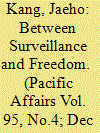

|
|
|
|
|
| Summary/Abstract |
The South Korean response to the COVID-19 pandemic was mainly characterized—whether positively or negatively—as the efficient implementation of surveillance supported by the extensive deployment of information and communication technologies (ICTs). Yet, the fact that the South Korean management of the pandemic was also maintained by citizens’ voluntary participation in stringent quarantine policies has received little critical attention. Through the lens of techno-politics, this essay examines the distinctive interplay of digital monitoring systems and civic engagement in South Korea during the pandemic, with particular reference to data surveillance, horizontal collectivism, and a networked multitude. In capturing the essential features of South Korean pandemic politics as reflecting key components of techno-populism, this essay draws out some social theoretical implications of reconsidering the increasingly close relationship between technology and democracy in the pandemic period.
|
|
|
|
|
|
|
|
|
|
|
|
|
|
|
|
| 2 |
ID:
187418
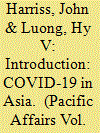

|
|
|
|
|
| Summary/Abstract |
In this introduction to studies of the politics of the COVID-19 pandemic in four Asian states—India, Pakistan, Vietnam, and South Korea—we first discuss the difficulties in evaluating the performances of different countries, given the varying reliability of data and the different possible criteria that may be applied. In our studies we aim rather to illuminate the process of different state responses, and we go on to summarize evidence on different patterns of response across Asia, situating the four country studies in a comparative context. We then review arguments in the literature about the determinants of different responses, before presenting our framework for the analysis of the politics that underlie these differences. Political leadership has undoubtedly exercised a powerful influence, but in the structural context of the relationships of state and citizens. We argue that understanding of these relationships is advanced by an analytical framework that draws on state-in-society approaches developed in the work of Joel Migdal, Michael Mann, and Peter Evans.
|
|
|
|
|
|
|
|
|
|
|
|
|
|
|
|
| 3 |
ID:
187420
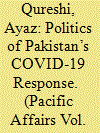

|
|
|
|
|
| Summary/Abstract |
This paper takes a “state-in society” approach to understanding the evolution of Pakistan’s COVID-19 response, which was laid claim to and contested by multiple agencies within and adjacent to the state, and by multiple levels of government. The capacity of the health system of Pakistan was already overstretched by the needs of its population but in recent years it has been hamstrung by ongoing protests by the medical community concerning the privatization of public-sector hospitals, to which were added protests over the lack of personal protective equipment in the public sector. These protests resulted in frequent closures of outpatient departments at major hospitals. When the government announced a relief package to mitigate the effects of COVID-19, traders and big businesses lobbied the government to obtain the lion’s share in the form of concessions such as loan deferments and tax refunds. The government touted the unconditional cash grants program but the cash for the poor could not be disbursed effectively due to the absence of local governments at the grassroots level. As an appropriate response to the pandemic, especially in relation to the lockdown policies, was contested and negotiated among multiple actors in the Pakistani state and society, the Pakistani military emerged as a dominant force in this “field of power.”1 In this paper, I present an account of Pakistan’s response to COVID-19 as it evolved in 2020 and discuss the implications for democratic culture in Pakistan.
|
|
|
|
|
|
|
|
|
|
|
|
|
|
|
|
| 4 |
ID:
187421
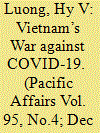

|
|
|
|
|
| Summary/Abstract |
Vietnam effectively controlled the COVID-19 pandemic until April 2021, and faced great challenges afterwards, partly due to the spread of the highly transmissible Delta and Omicron strains of the coronavirus. Adopting Joel Migdal’s “state-in-society” approach, this article focuses not on the impact of regime type, but on the fear-driven tension and the process of negotiation among different levels of the state apparatus and between state and society during the COVID-19 pandemic in Vietnam. The evolution of this pandemic was shaped not only by state measures but also by citizens’ fear-driven situational variation in norm compliance, as well as by the historical and cultural backgrounds of a society, specifically the wide sharing of war experiences and the war metaphor in Vietnamese society, and the non-negative meaning of face masks in daily life.
|
|
|
|
|
|
|
|
|
|
|
|
|
|
|
|
| 5 |
ID:
187419
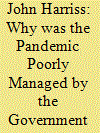

|
|
|
|
|
| Summary/Abstract |
Administrative “success” or “failure” during the pandemic are hard to assess given uncertainties both of criteria and of data. But there can be no doubt about the mishandling of the pandemic at crucial junctures by the Indian government, or about the culpability of prime minister Narendra Modi himself. He has this in common with other “strongmen” of contemporary world politics, but Modi was unusually successful in turning the events of the pandemic to reinforce his dominance. The immediate political factors that influenced the Indian response had to do with political leadership and with the “decisionism” that characterised Modi’s actions, but in the context of the pursuit of the goals of Hindu nationalism. This article explains the responses of the Indian government drawing on a framework based on the comparative analysis of Baum and her co-authors. It shows how the events of the pandemic reflect on India’s politics and on the character of the Indian state, using a state-in-society approach suggested by the interlocking arguments of Migdal, Mann and Evans. This highlights and explains the very different responses of the major states of the country.
|
|
|
|
|
|
|
|
|
|
|
|
|
|
|
|
|
|
|
|
|